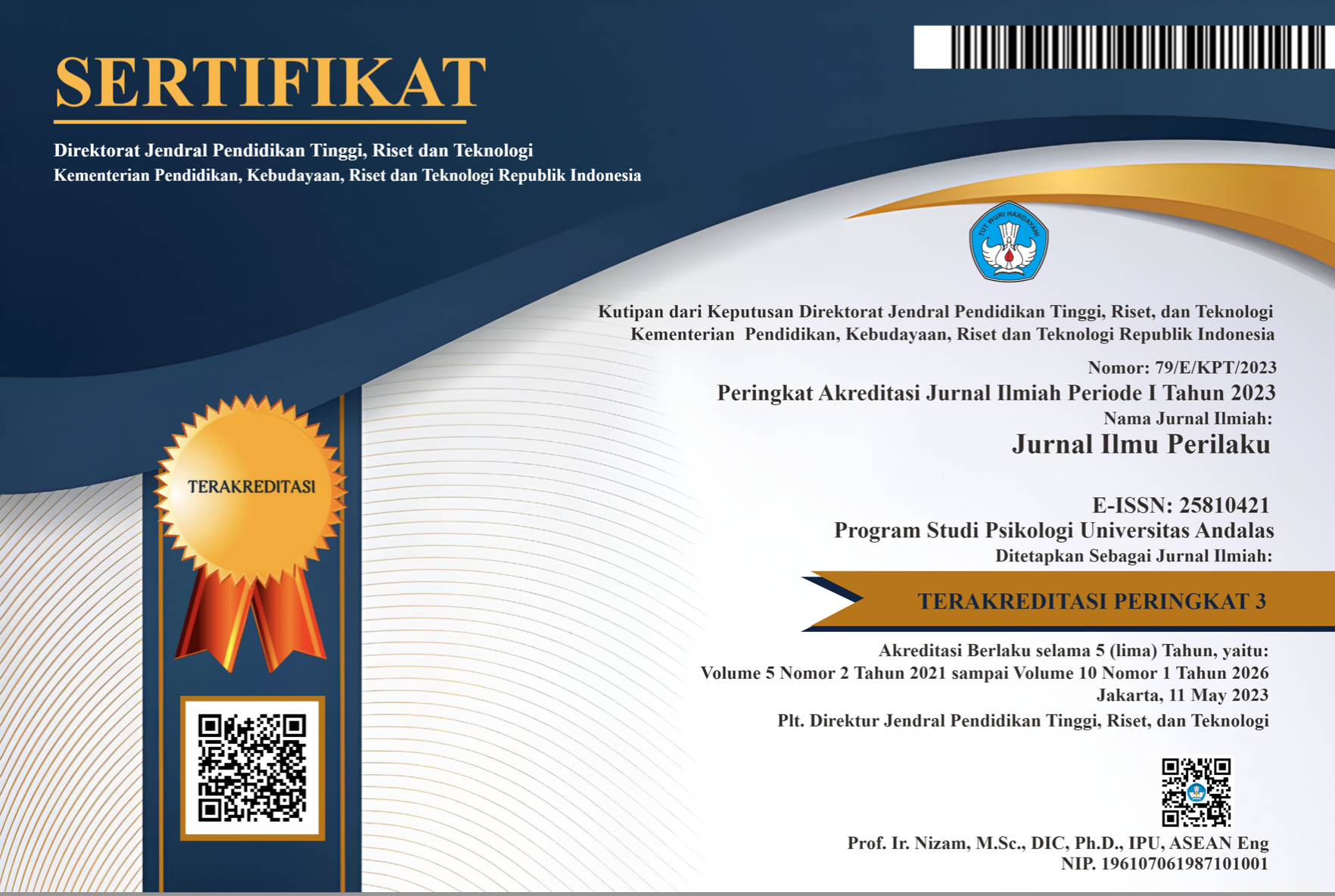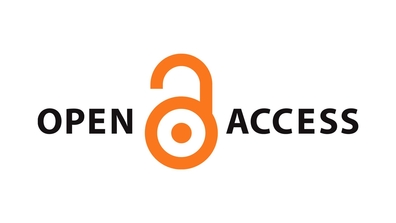Benarkah Dewasa Madya Mempersepsikan Berita Kesehatan di Internet sebagai Berita yang Kredibel?
Abstract
The increasing use of social media is followed by the rising spread of fake news. This phenomenon often occurs among middle adults, who usually share the news they receive without knowing the credibility of the news. Looking at the news features is one way to judge its credibility. This study aimed to identify the effect of news’ features, especially the news platform, and supporting data on the news credibility perception in middle adults. This study used an experimental approach with a factorial design. The participants in this research were 120 middle-aged social media users who were assigned randomly in four conditions, namely news with supporting data via Whatsapp, news without supporting data via Whatsapp, news with supporting data via Kompas website, and news without supporting data via Kompas website. The data were collected using an online survey and were analyzed using ANOVA. This study found that there was no significant effect of supporting data and news platforms on news credibility perception in participants. This means that they tend to perceive the credibility of the news without considering the existence of supporting data or reliable news platforms. Adults need to be more careful in believing the news and consider the important aspects that characterize credible news.
Downloads
References
Brashier, N. M., & Schacter, D. L. (2020). Aging in an era of fake news. Current Directions in Psychological Science, 29(3), 316–323. https://doi.org/10.1177/0963721420915872 Christensen, L. B. (2007). Experimental methodology (10th ed.). Boston (Mass): Pearson.
Daniel, E. (2016). The usefulness of qualitative and quantitative approaches and methods in researching problem-solving ability in science education curriculum. Journal of Education and Practice, 7, 91–100.
Démuth, A. (2012). Perception theories. In Applications of Case Study Research (Issue 4). Edícia kognitívne štúdia.
DeWall, C. N., & Myers, D. G. (2015). Psychology in Modules (11th ed.). New York: Worth Publishers, A Macmillan Learning.
Dewan Pers. (2019). Data Perusahaan Pers. https://dewanpers.or.id/data/perusahaanpers Fitriarti, E. A. (2019). Urgensi literasi digital dalam menangkal hoax informasi kesehatan di era digital. Metacommunication: Journal of Communication Studies, 4(2), 234-246. E-ISSN: 2549-693X
Galotti, K. M. (2017). Cognitive psychology in and out of the laboratory. Sage Publications. Halim, D. (2019, Juni 15). Tren penyebaran hoaks mulai beralih ke grup WhatsApp, polisi lakukan patroli siber. Kompas.com. https://nasional.kompas.com/read/2019/06/15/09285391/tren-penyebaran-hoaks- mulai-beralih-ke-grup-whatsapp-polisi-lakukan-patroli?page=all
Halim, D. (2020, September, 5). 6 bulan pandemi covid-19: Hoaks dan teori konspirasi yang memperparah penanganan. Kompas.com. https://nasional.kompas.com/read/2020/09/05/09090921/6-bulan-pandemi-covid- 19-hoaks-dan-teori-konspirasi-yang-memperparah?page=all
Haq, A. D., & Fadilah, E. (2019). Transformasi harian kompas menjadi portal berita digital subscription Kompas.Id. Jurnal Kajian Jurnalisme, 1(2), 190–213. https://doi.org/10.24198/jkj.v1i2.21339
Ilahi, H. N. (2019). Women and hoax news processing on WhatsApp. Jurnal Ilmu Sosial dan Ilmu Politik, 22(2), 98. https://doi.org/10.22146/jsp.31865
Johnson, T. J., & Kaye, B. K. (1998). Cruising is believing?: Comparing Internet and traditional sources on media credibility measures. Journalism & Mass Communication Quarterly, 75(2), 325–340. https://doi.org/10.1177/107769909807500208
Kenyon, G. N., & Sen, K. C. (2015). The perception process. In the Perception of Quality (pp. 41–50). Springer London. https://doi.org/10.1007/978-1-4471-6627-6_5
Loos, E., & Nijenhuis, J. (2020). Consuming fake news: A matter of age? The perception of political fake news stories in Facebook ads. In International Conference on Human- Computer Interaction (pp. 69–88). Springer. https://doi.org/10.1007/978-3-030-50232- 4_6
Loosen, W., Reimer, J., & Schmidt, F. (2015). When data become news, a content analysis of data journalism pieces. The Future of Journalism: Risks, Threats and Opportunities, September, 1–22.
Mulawarman, M., & Nurfitri, A. D. (2017). Perilaku pengguna media sosial beserta implikasinya ditinjau dari perspektif psikologi sosial terapan. Buletin Psikologi, 25(1), 36–44. https://doi.org/10.22146/buletinpsikologi.22759
Myers, D. G. (2009). Psychology in modules (9th ed.). New York: Worth Publishers.
Poler, M. K., Štular, K., & Erjavec, K. (2010). Credibility of traditional vs. online news media: A historical change in journalists’ perceptions? Medijska Istraživanja: Znanstveno-Stručni Časopis Za Novinarstvo i Medije, 16(1), 113–130.
Pratama, A. B. (2016, Desember 29). Ada 800 ribu situs penyebar hoax di Indonesia. CNN Indonesia. https://www.cnnindonesia.com/teknologi/20161229170130-185-182956/ada-800-ribu-situs-penyebar-hoax-di-indonesia
Purwadi, D. (2017, Desember 12). Ada 800.000 situs penyebar hoax di Indonesia. Kementerian Komunikasi dan Informatika Republik Indonesia. https://kominfo.go.id/content/detail/12008/ada-800000-situs-penyebar-hoax-di- indonesia/0/sorotan_media
Reza. (2018, November 16). Kominfo: Penyebar hoaks berkisar usia 45 ke atas.
Liputan6.com. https://www.liputan6.com/news/read/3694098/kominfo-penyebar-
hoaks-berkisar-usia-45-ke-atas
Rich, A. (2001). The politics of expertise in congress and the news media. Social Science
Quarterly, 82, 583–601. https://doi.org/10.1111/0038-4941.00044
Rijdt, J. (2019). “Fake it till you make it”: An experiment of fake news perception by use of experts
and support. The University of Twente.
Santrock, J. W. (2019). Life-span development, 7th ed. In Life-span development, 7th ed.
New York: McGraw-Hill Higher Education.
Sari, A. C., Hartina, R., Awalia, R., & Iriyanti, H. (2018). Komunikasi dan media sosial
(Issue December).
Sawyer, S. F. (2009). Analysis of variance: The fundamental concepts. Journal of Manual& Manipulative Therapy, 17(2), 27E-38E. https://doi.org/10.1179/jmt.2009.17.2.27E
Susilo, M. E., Afifi, S., & Yustitia, S. (2020). Hoax as a reflection on the low digital literacy in Indonesia. Proceedings of the Second International Conference on Social, Economy, Education, and Humanity (ICoSEEH 2019) - Sustainable Development in Developing Country for Facing Industrial Revolution 4.0, 165-174.
Ursachi, G., Horodnic, I. A., & Zait, A. (2015). How reliable are measurement scales?
External factors with indirect influence on reliability estimators. Procedia Economics
and Finance, 20, 679–686. https://doi.org/10.1016/S2212-5671(15)00123-9
Visentin, M., Pizzi, G., & Pichierri, M. (2019). Fake news, real problems for brands: The impact of content truthfulness and source credibility on consumers’ behavioral intentions toward the advertised brands. Journal of Interactive Marketing, 45, 99–112.https://doi.org/10.1016/j.intmar.2018.09.001
Vosoughi, S., Roy, D., & Aral, S. (2018). The spread of true and false news online. Science, 359(6380), 1146–1151. https://doi.org/10.1126/science.aap9559
Warnick, B. (2004). Online Ethos. American Behavioral Scientist, 48(2), 256–265. https://doi.org/10.1177/0002764204267273
Westerman, D., Spence, P. R., & Van Der Heide, B. (2012). A social network as information: The effect of system generated reports of connectedness on credibility on Twitter. Computers in Human Behavior, 28(1), 199–206. https://doi.org/10.1016/j.chb.2011.09.001
Wrzus, C., Hänel, M., Wagner, J., & Neyer, F. J. (2013). Social network changes and life events across the life span: A meta-analysis. Psychological Bulletin, 139(1), 53–80. https://doi.org/10.1037/a0028601

This work is licensed under a Creative Commons Attribution-NonCommercial-ShareAlike 4.0 International License.
The non-commercial use of the article is governed by the Creative Commons Attribution license as currently displayed on Creative Commons Attribution-NonCommercial-ShareAlike 4.0 International License.
JIP's spirit is to disseminate articles published are as free as possible. Under the Creative Commons license, JIP permits users to copy, distribute, display, and perform the work for non-commercial purposes only. Users will also need to attribute authors and JIP on distributing works in the journal.
Please find the rights and licenses in Jurnal Ilmu Perilaku (JIP).
- License
The non-commercial use of the article will be governed by the Creative Commons Attribution license as currently displayed on Creative Commons Attribution-NonCommercial-ShareAlike 4.0 International License.
- Author’s Warranties
The author warrants that the article is original, written by stated author(s), has not been published before, contains no unlawful statements, does not infringe the rights of others, is subject to copyright that is vested exclusively in the author and free of any third party rights, and that any necessary written permissions to quote from other sources have been obtained by the author(s).
- User Rights
JIP's spirit is to disseminate articles published are as free as possible. Under the Creative Commons license, JIP permits users to copy, distribute, display, and perform the work for non-commercial purposes only. Users will also need to attribute authors and JIP on distributing works in the journal.
- Rights of Authors
Authors retain the following rights:
- Copyright, and other proprietary rights relating to the article, such as patent rights,
- The right to use the substance of the article in future own works, including lectures and books,
- The right to reproduce the article for own purposes, provided the copies are not offered for sale,
- The right to self-archive the article.
- Co-Authorship
If the article was jointly prepared by other authors, the signatory of this form warrants that he/she has been authorized by all co-authors to sign this agreement on their behalf, and agrees to inform his/her co-authors of the terms of this agreement.
- Termination
This agreement can be terminated by the author or JIP upon two months’ notice where the other party has materially breached this agreement and failed to remedy such breach within a month of being given the terminating party’s notice requesting such breach to be remedied. No breach or violation of this agreement will cause this agreement or any license granted in it to terminate automatically or affect the definition of JIP.
- Royalties
This agreement entitles the author to no royalties or other fees. To such extent as legally permissible, the author waives his or her right to collect royalties relative to the article in respect of any use of the article by JIP or its sublicensee.
- Miscellaneous
JIP will publish the article (or have it published) in the journal if the article’s editorial process is successfully completed and JIP or its sublicensee has become obligated to have the article published. JIP may conform the article to a style of punctuation, spelling, capitalization, referencing and usage that it deems appropriate. The author acknowledges that the article may be published so that it will be publicly accessible and such access will be free of charge for the readers.










